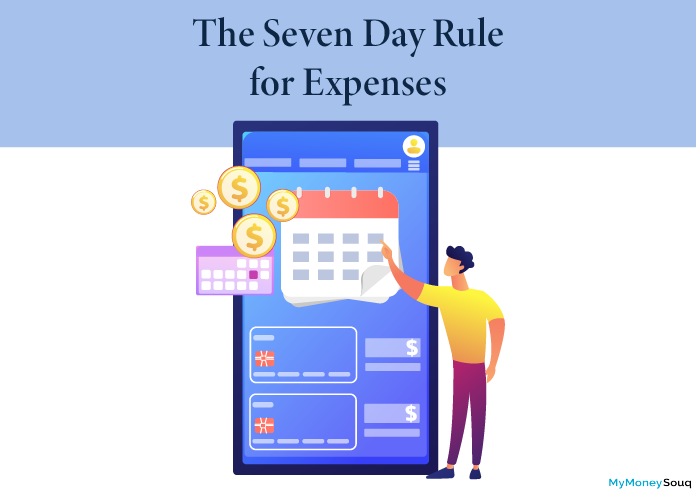The seven-day rule for expenses is when you want to buy any item, which can be a car, fridge, or product. If a product is out of budget and you want to buy it, give yourself seven days to think about it and decide on purchasing the product or not.
For example, if you went shopping and you wish to buy a dress but it is out of budget give yourself seven days time and in the heat do not immediately rush and buy the product. By giving a certain amount of time you are allowing a cooling period and making the decision.
If you ask what will happen after seven days then you will have answers to the following questions.
- Is this product or item required to purchase now?
- What is your opinion on the product after 7 days?
- How will this product fit into the budget?
- Is it a necessary expense or a casual expense?
Once you have answers to all these questions and feel comfortable about purchasing the product even after seven days then it is time to align the product in your budget. After you align the product with your budget then it is time to buy the product.
It is important to think about how your money is going out and how it will affect your pocket? You can decide if the expense is significant or insignificant to spend the amount.
We can decide if the product is useful or not and based on this decision you can allocate funds towards the item. You will be in a position to justify the purchase in your budget allocation.
How much is spent is difficult to analyze in cashless spending unless you look into the bank statements. You will most likely not know where your money is going unless you meticulously track your spending. The seven-day rule will help you in alerting and also allocating funds towards expenses.
The seven-day rule of expense is a strategy to turn away impulsive spending. It allows you to have a cooling-off period prior to making the purchase over and above the budget limit. When you delay your purchase decision, you can avoid excitement. This will help you not to buy those things which you do not want. These can be spending on holiday trips, buying new clothes, buying because of offers, discounts, enticing advertisements and others. You may not need the product but you will tend to buy the product because of the excitement of buying.
Click here for Top thumb rules of Investing
What should you do?
You should have an understanding of the need for purchase. Do your research and compare the prices when you are selecting the product. Always look out for the best deal you always want to have. There is nothing wrong with negotiating the price. Wherever possible do price negotiation when you are purchasing the product. Ask yourself a few questions and wait for seven days to finalize the purchase.
- Do I need the product?
- Given the price, does it make sense to buy?
If you have an answer as yes to the above questions then you can go ahead and do the purchase. You can only answer yourself what fits best your requirements. You can make an amendment in the number of days if you are not satisfied and need time to analyze. Take 14 days time to think over and if you are worried about losing the deal then remember there is always another deal that will come up. The important thing is you should be satisfied with what you purchase.
Click here for Top 7 thumb rules to plan your finances
Initially, it will be difficult to implement this strategy as purchasing items above your budget line will be difficult to manage. Implement the seven days rule for purchases between AED 100 to AED 1000. Start with this small amount for a period of time and you will realize the significance. See if the product will add satisfaction and value to your life. Do this the next time when you are making big purchases and feel the difference.
Take away
The seven-day rule for expenses is important because it will help you to avoid impulsive purchases like buying a new car or new house or any product. By giving time of seven days you can decide on whether you really want to purchase the product or not. You may find alternatives instead of purchasing the product if the item goes beyond your budget.
With a seven-day rule for expenses, you can avoid hasty purchases. By avoiding hasty purchases you can avoid unnecessary EMIs and out-of-budget expenses. Impulsive purchases can be reduced by setting aside a cooling-down period. The seven days rule will help you decide after the cooling-off period whether you actually need the item or not. Make purchases after the cooling-off period. By practicing this rule you can realize if the expense is worth it for you or not.
About the author
Vinay Kumar Goguru is a finance professional with more than 8 years of diverse experience as a researcher, instructor and Industry work experience with both public and private entities. Prior to MyMoneySouq, he spent 6 years in Berkadia, It's a commercial mortgage banking company. He has a "Doctoral Degree in Commerce" and two master's degrees with a specialization in Finance, one as Master of Commerce and other as Master of Business Administration. He has written several articles on personal finance, published by different International journals. He loves traveling, reading and writing is his passion. He has a dream of writing a book on his favorite finance topics.


